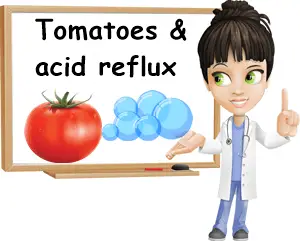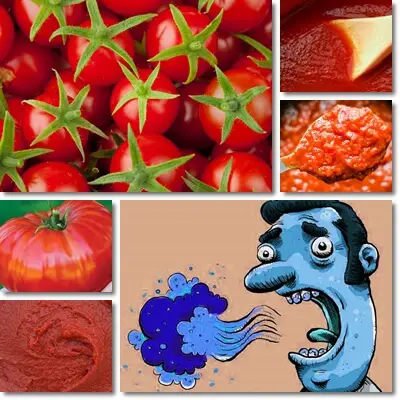Do you have acid reflux and heartburn? Can you eat tomatoes with acid reflux and heartburn? Does eating tomatoes cause acid reflux and heartburn? If you’ve been on the fence about having tomatoes because you have GERD and are concerned about side effects such as acid reflux, heartburn, nausea, excessive burping, a sore throat or a bad taste in the mouth, then read on to find out all about tomatoes and if and how they cause acid reflux and heartburn.
What is acid reflux?
Acid reflux disease, formally known as gastroesophageal reflux disease (GERD), is a digestive condition characterized by the regurgitation of stomach juices and sometimes also food particles. Experiencing two to three acid reflux episodes per week is considered a sign of acid reflux disease. In addition to antacids and proton pump inhibitors, dietary changes are a pivotal part of acid reflux treatment. High-fat foods, fried foods, processed foods (e.g. chips), spicy foods and acidic foods from pickles to lemons, lemon juice, tomatoes and tomato sauce are common trigger foods that bring about acid reflux episodes.

What is heartburn?
Heartburn is a symptom of acid reflux disease. Stomach juice is naturally acidic, corrosive even, so as it escapes the stomach and flows back up into the esophagus during an acid reflux episode, it irritates the esophagus lining. This causes a burning sensation that can be felt in the middle of the chest around where the heart is located, hence the name heartburn, and even higher up, in the back of the throat, depending on how high the stomach juices go.
In more severe cases, regurgitated stomach juices pour back into the mouth causing a bad, acidic, metallic or sour taste in the mouth. Aside from heartburn, other symptoms of acid reflux may include excessive burping, bloating, a sore throat and sore tongue, hoarseness and coughing due to acid reflux. If the symptoms occur at night, they usually wake a person up from their sleep. Learn more about acid reflux at night.
Do tomatoes cause acid reflux?
Tomatoes themselves hardly cause acid reflux in a healthy person with good digestive health and no history of GERD who is also eating relatively clean and balanced. However, eating tomatoes can definitely trigger the backflow of stomach juices and cause acid reflux if the person consuming them already has acid reflux disease, either an active disease or a history of it.
If the acid reflux is severe, then most tomato byproducts can act as triggers, including tomato sauce, tomato paste, tomato juice, canned tomato products, and even fresh tomatoes. Ingredients such as cooking oils, onions, garlic, peppers, vinegar, lemon juice or hot spices added to tomato products are more likely to and often cause more severe acid reflux episodes versus fresh tomatoes eaten by themselves.
If the acid reflux is mild to moderate, fresh tomatoes may be tolerated well in limited amounts, as well as plain tomato sauces made from cooked fresh tomatoes, without the addition of onions, garlic, peppers, acidic or spicy ingredients.
You may find you don’t tolerate more acidic varieties of tomatoes, or may not tolerate regular red tomatoes at all. But you may tolerate yellow tomatoes which, overall, tend to be less acidic. Each person is different and what may work for someone won’t likely work for everyone.
See also : Is Turmeric Good For Acid Reflux?

Why are tomatoes a trigger food for acid reflux?
In an established disease especially, tomatoes and tomato byproducts represent a trigger food for acid reflux. That is, eating tomatoes or tomato products can cause acid reflux and symptoms such as heartburn, excessive burping, a bad taste in the mouth or a sore throat in people that already have acid reflux. But why? Potential reasons may include the following:
Tomatoes are naturally acidic and thus trigger-foods.
Some varieties more than others, but nonetheless still acidic. Acidic foods are known triggers for acid reflux disease, whether it’s tomatoes, tomato concentrate, paste or sauce, tomato juice, vinegar, lemon, lemon juice, oranges, orange juice, sour yogurt, buttermilk, soured milk, pickle juice etc. In an established disease, these kinds of foods become even stronger triggers.
An existing disease creates susceptibility to more acid reflux episodes.
Acid reflux disease is characterized by a state of hyperacidity. While stomach juices are far more acidic than tomatoes, tomatoes are sufficiently acidic naturally to work up an already upset stomach even more, encouraging the overproduction of stomach juices. This then results in episodes of acid reflux, setting up the way for a vicious circle of events that reinforce themselves in a loop-type pattern.
Some tomato products are worse for acid reflux than others.
Tomatoes top the list of foods that cause acid reflux. But while sometimes fresh tomatoes don’t cause acid reflux at all, most, if not all tomato byproducts usually do. At the top of the list we have tomato concentrate, tomato paste, tomato sauce, canned tomato products and tomato juice. And it’s not just store-bought tomato products, but also home-made ones.
Store-bought tomato products often have additives such as dyes, acidity regulators, thickeners etc. and preservatives that are common causes of acid reflux in addition to the tomato product itself. Home-made tomato products on the other hand commonly cause acid reflux if they contain other ingredients that are triggers for acid reflux such as peppers, garlic and onion, but also because of the tomato product itself.
And the reason why sometimes the fresh tomatoes don’t trigger acid reflux, but tomato byproducts do has to do with the processing the culinary vegetable undergoes as it’s turned into canned tomato juice, tomato paste or concentrate. Actually cooking tomatoes changes their makeup and makes them more likely to cause acid reflux vs tomatoes in their fresh state.
Added ingredients may be the culprit.
Not all tomato products have just tomatoes in them. Added ingredients such as onions, chives, garlic, too much oil or butter, sweet or spicy peppers, sweet or spicy paprika, ginger, turmeric, pepper, mustard seeds or paste, vinegar, lemon juice, wine, heavy meats (beef, pork, sausage), citric acid, various preservatives etc. are common triggers for acid reflux episodes and can contribute to acid reflux together with the tomatoes.
It’s the amount.
How much of something you eat can determine if it’s good or bad for you. Even with acid reflux you may be able to enjoy fresh tomatoes once or twice a week and feel great, with no flareups. Or even have a nice pasta with a quality tomato sauce every now and then. But if you start eating tomato sauce every day or every other day, and choose dishes that require quite a lot of it (e.g. pasta or chili or lasagna), or have tomato sauce at night before bed, then your chances of experiencing acid reflux grow exponentially.
Are tomatoes good for acid reflux?
What benefits do tomatoes give you for acid reflux, if any? Tomatoes do not do anything good for acid reflux specifically as in treat it, but they can definitely cause acid reflux or worsen it if it’s already there.
If your acid reflux is severe, it might be a good idea to just go on a strict diet for a month or more and exclude all trigger foods until your condition improves significantly, including tomatoes and byproducts.
Find out what foods to eat and to avoid for acid reflux to help you on your acid reflux journey.
And only after you no longer experience acid reflux for a good few weeks can you start reintroducing certain foods back into your diet, gradually and in small amounts, and observe how you react to them.
You can start with fresh tomatoes, once a week or twice, an eat them raw, with or without skin, or only lightly cooked, preferable stewed.
Monitor how you feel so you can tell which foods you will be able to eat and which you may need to avoid almost completely, except for maybe an occasional treat if it’s something you really like. You may find that you can have fresh tomatoes, and even use fresh tomatoes for pasta sauce or chili or morning eggs, but more processed options such as tomato paste or concentrate, or even canned tomatoes, might just need to be off-limits for you.
